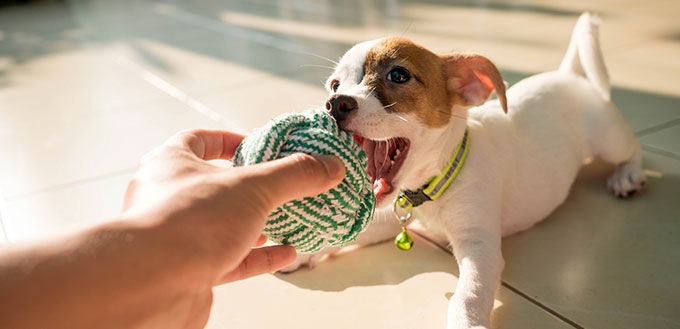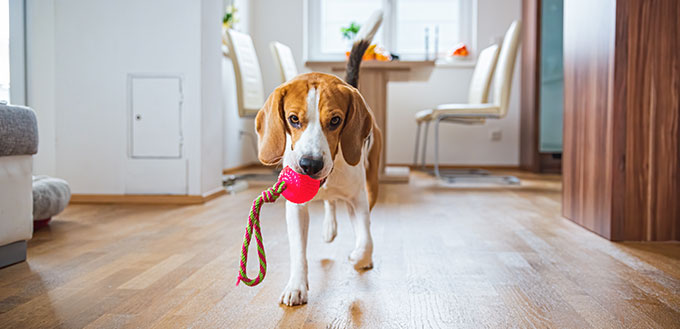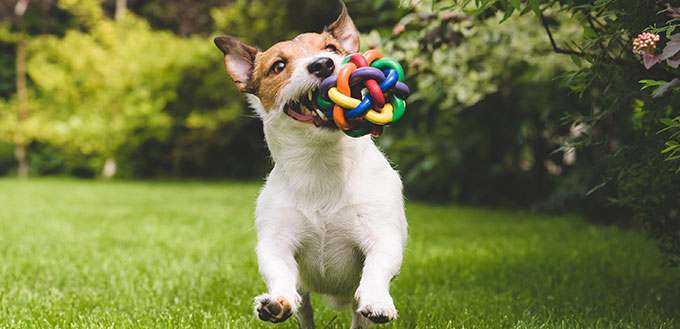We all love that perfectly innocent moment when you come home, and your pooch, overcome with excitement over your arrival, brings you their favorite toy! You may wonder why my dog brings me a toy when I get home. Well, here we’re going to break down the ideas and theories behind the reasons for question of why dogs bring you toys when you get home.
They’re Being a Showoff
All breeds behave differently, and some dogs are all for running up to you, new toy in mouth, and eagerly presenting it to you as if they want you to throw it, but then hopping or twisting out of reach before you can take it off them.
So Why Do They Do it?
There is the idea that your pup wants to show you this awesome thing they have, but with absolutely no intention of giving it up. This may seem a little bit frustrating, but you’ve got to admit, it’s extremely cute. And there is a potentially very good reason for it! Your pup may have figured out that when they carry a toy, they are given more attention, so they have decided that grabbing a toy on your arrival home will give them all the undivided attention they want!
Though it is always possible that your pup sees it as a fun little game of keep-away, they have succeeded in getting your attention and interaction, just like they wanted.
1. They can’t bear to part with it
When some dogs receive a toy far away from the best dog toy they have received to date, you may find they never want to be away from it. They will likely walk from room to room, toy in their mouth, going about their daily business as usual, or it may be the toy they sleep with their head resting against.
Then why bring it to me?
If you imagine for a moment that your dog is like a child, when a child gets that new favorite toy for Christmas, it is impossible to get it away from them. Dogs are very much the same, they may even decide to take their toys on walks with them. The same goes for the question, “why does my dog bring me his bone?” if your dog brings you their favorite toy, they are showing that they can trust you not to take it away.
2. They are being overprotective of their toy
This is a tricky one. Some dogs will grow overly attached to a toy from the off. This can often happen if the toy is soft and fluffy or squeaks and can be attributed to their natural prey drive response to the sound of a small animal in distress or the feel of a small animal in its mouth.
2.1. What does this mean for my dog’s behavior?
First of all, it is important to remember that every dog is different, not just in breeds, but from dog to dog, and so this should be taken with a pinch of salt until you have witnessed these behaviors for yourself.
This reaction is based on a natural desire to protect their food from other predators. The signs can be as simple as staying in the far corner of the room to enjoy their new toy in peace, or they can include a more aggressive approach, such as snarling, growling, barking, or even snapping at people who encroach on their space.
This obsessive attachment to a toy can mean that they may meet you at the door with their new toy, exhibiting all the signs of being happy that you’re home but not allowing you to get too close and exhibiting defensive behavior or closed-off body language and no making eye contact.
2.2. What should I do in this instance?
This is not ideal behavior with family dogs, so it is worth gently enticing your dog away from the toy if you can and taking it away. If they have been taught well to leave something on command, you can have them drop it and leave it for you to pick up and remove it.
Dogs who exhibit this behavior often benefit more from the indestructible type of dog toys rather than soft and squeaky dog toys. and if their behavior does not seem to improve or concerns you in any way, it would be advisable to speak with your veterinarian.
3. Your Pup Wants to Play
You see, while you’ve been out of the house, running errands and working, your dog has simply sat at home, playing with their doggy puzzle toys, or perhaps a DIY dog toy that you made for them awaiting your return. The second you get home, that’s when playtime begins!
Your coming home will likely be the highlight of their day. All they will want is to be with you, play with you, and engage with you. This energy level could go on for hours or last 5 minutes. If the first thing you did when they were little puppies arriving home was to grab a toy and play with them, they likely learned that this is how things go.
3.1. It may always be the same toy
Adding to this, if the toy your dog brings is that one toy you always picked up, perhaps a rope for a little game of tug of war, then it stands to reason that this is the one they assume you want. And if you find that your dog brings toys to the baby, they are simply passing down the tradition.
3.2. It’s not just me, they do it with the guests!
If your guests are people you see regularly, they will view them as an extension of the pack and bring toys to them at the door to engage a new playmate and extend their playtime circle.
4. They need a distraction
Some dogs simply keep toys with them when they are excited because that is what they have been conditioned to do, and it has become a learned behavior.
4.1. Redirecting their energy
If your dog was nippy with their excitement as a puppy, it could be that you would provide them with a puppy chew toy to redirect their energy. Once this has been a repeated occurrence for a while, they can learn that when excited, they should grab a toy, which is extremely helpful conditioning for dogs that use their mouth a lot, as they can’t very well nip you if they’re got a toy in their mouth!
5. They want to please their alpha
Then there is the classic theory of pack hierarchy and the idea of gift-giving for their alpha. They may bring you a toy on instinct to please you if they see you as their alpha, to ensure that they hold their place within the pack.
And If I Want Them to Stop Doing It?
Like most things, it is a simple matter of training. Seek help from a dog trainer if you are struggling, and you can get them out of the habit with some time and patience. Though consider it carefully, you may find that without this little quirk of behavior, your dog’s greetings don’t seem quite the same.










